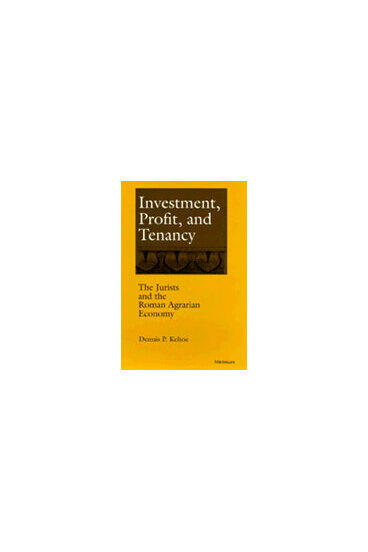Investment, Profit, and Tenancy
The Jurists and the Roman Agrarian Economy
Considers the agricultural underpinnings of the ancient Roman economy
Description
The economy of the Roman Empire was dominated by the business of agriculture. It employed the vast majority of the Empire's labor force and provided the wealth on which the upper classes depended for their social privileges. Consequently, the way in which upper-class Romans maintained and profited from their agricultural investments played a crucial role in shaping the basic relationships characterizing the Roman economy.
In Investment, Profit, and Tenancy Dennis P. Kehoe defines the economic mentality of upper-class Romans by analyzing the assumptions that Roman jurists in the Digest of Justinian made about investment and profit in agriculture as they addressed legal issues involving private property. In particular the author analyzes the duties of guardians in managing the property of their wards, and the bequeathing of agricultural property. He bases his analysis on Roman legal sources, which offer a comprehensive picture of the economic interests of upper-class Romans. Farm tenancy was crucial to these interests, and Kehoe carefully examines how Roman landowners contended with the legal, social, and economic institutions surrounding farm tenancy as they pursued security from their agricultural investments.
Kehoe argues that Roman jurists offer a consistent picture of agriculture as a form of investment that was grounded in upper-class conceptions of the Roman economy. In the eyes of the jurists, agriculture represented the only form of investment capable of providing upper-class Romans with economic security, and this situation had important implications for the relationship between landowners and tenants. Landowners who sought economic stability from their agricultural holdings preferred to simplify the task of managing their estates by delegating the work and costs to their tenants. This tended to make landowners depend on the expertise and resources of tenants, which in turn gave the tenants significant bargaining power. This dynamic relationship is traced in the jurists' regulation of farm tenancy, as the jurists adapted Roman law to the economic realities of the Roman empire.
Investment, Profit, and Tenancy will be of interest to classicists as well as to scholars of preindustrial comparative economics.
Dennis P. Kehoe is Professor of Classical Studies, Tulane University.
Dennis P. Kehoe is Professor of Classical Studies, Tulane University.
Reviews
". . . a thorough and well-researched investigation into an important aspect of Roman law and the Roman economy. "
- Daniel J. Gargola University of Kentucky
—Daniel J. Gargola University of Kentucky, American Journal of Philology, Summer 1999
"[Kehoe] applies his solid understanding of the sources, processes, and administration of Roman law to fields cherished by the Roman elite: rural economics and the legalities pertaining to them. Kehoe's study is highly readable, thoroughly grounded in primary and modern sources, respectful of comparative evidence for other preindustrial societies, and persuasive in its argument for the impact and influence of economic realities on the (frequently) idealistic presumptions of Roman legal scholars, ancient and modern."
- Choice
—Choice
"Kehoe is able to construct a rich and persuasive picture of the way that members of the Roman élite in the early centuries of the Principate managed the landed estates from which they derived most of their incomes. . . . . [H]is book will be required reading for any future account of the Roman agrarian economy."
- Neville Morley, Univ. of Bristol
—Neville Morley, Univ. of Bristol, Journal of Roman Studies, Volume 90 (2000)
News, Reviews, Interviews
Wall Street Journal interview | 8/30/2010

